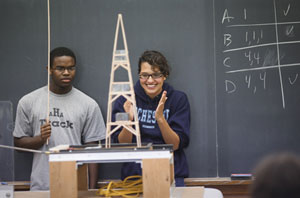 Over the summer, eight students from the Class of 2013 came to campus early to participate in the Summer Program to Advance Leadership (SPAL), which provides underrepresented, incoming students with a six-week, intensive session focusing on the science, technology, engineering, and mathematics fields.
Over the summer, eight students from the Class of 2013 came to campus early to participate in the Summer Program to Advance Leadership (SPAL), which provides underrepresented, incoming students with a six-week, intensive session focusing on the science, technology, engineering, and mathematics fields.
The program was supported through the generosity of Dan and Heidi Ludwick Hanson ’91. First-year students Emerald Lagow (Houston, Texas), Juan Hernandez (Vineland, N.J.), Natalie Nater (Vega Baja, Puerto Rico), Brandon Laing (Drexel Hill, Pa.), Andrea Mikol (Wind Gap, Pa.), Jessica Rothstein (Narberth, Pa.), Darrell Washington (Trenton, N.J.), and Ryan Yarde (Brooklyn, N.Y.) participated.
They were selected because they show academic promise in science or engineering and have demonstrated the potential to become leaders in one or both fields. Priority for selection was given to students with high math SAT scores who are also from groups that are often underrepresented in science and engineering at Lafayette, such as students coming from outside the local region, students from low-income families, females, ethnic minorities, and students who are the first in their family to go to college.
“The college recognizes its responsibility to help our nation produce highly qualified new scientists and engineers. This program aids in getting more students into the pipeline while being mindful for the need for diversity in this population,” says Chawne Kimber, associate professor of mathematics and director of SPAL.
The goals of the program are to support the academic success of Lafayette students from groups underrepresented in science, technology, engineering, and mathematics fields who choose to major in those fields, and to realize the career success of those students.
From July 6 to Aug. 14, the students took and earned credit for College Writing and Calculus, and participated in a variety of short modules and presentations to introduce them to many science and engineering fields, the College campus, and Easton. Among the activities were field trips to visit local companies that employ scientists and engineers.
Participants received full tuition, books, dormitory housing, and meals during the six-week program. Additionally, upon successful completion of the program, each student received a stipend to cover wages they could have earned by working during those six weeks of the summer.
One measure of the program’s success could be read on the evaluation forms the students completed at the conclusion of SPAL. “I became oriented with the professors, campus, and college life while I was not under the stress of meeting all the new freshmen and a full course load in the fall,” one student wrote.
Another participant wrote, “The program has really made me excited for college. The combination of the great people I’ve met here mixed with the wide variety of knowledge that has been presented to me has contributed to this.”
In addition to the many faculty and staff who helped make the program a success, three students assisted with the program: English major Adriane Marcellus ’10 (Earlville, N.Y.) served as a writing coach; Teevrat Garg ’10 (Haryana, India), who is pursuing a B.S. in mathematics and an A.B. with a major in economics and business, served as a math tutor; and biology major Karen LeSage ’10 (Littleton, Mass.) provided guidance as a resident adviser. The student assistants helped the program participants adjust to campus life both academically and socially. In addition to their standard duties, the student assistants organized movies and field trips to expose students to issues involving different cultures, global citizenship, team-building, and campus resources.
 Over the summer, eight students from the Class of 2013 came to campus early to participate in the Summer Program to Advance Leadership (SPAL), which provides underrepresented, incoming students with a six-week, intensive session focusing on the science, technology, engineering, and mathematics fields.
Over the summer, eight students from the Class of 2013 came to campus early to participate in the Summer Program to Advance Leadership (SPAL), which provides underrepresented, incoming students with a six-week, intensive session focusing on the science, technology, engineering, and mathematics fields.